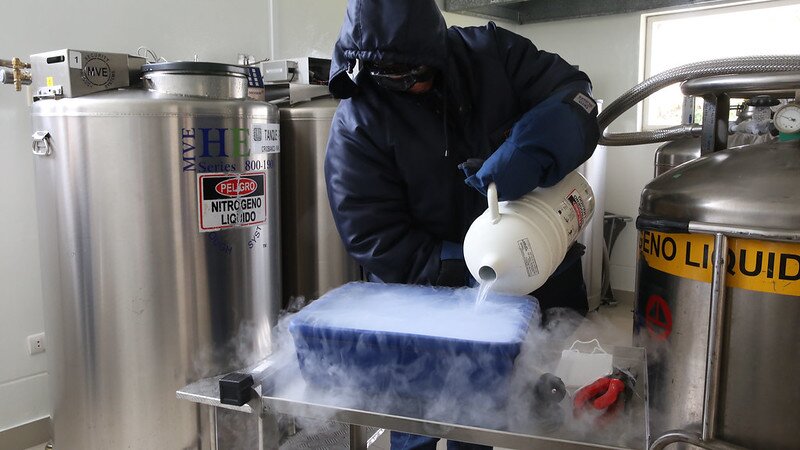Saving Hard-to-Conserve Food Crops
 April 2018: The Crop Trust visits the International Potato Center in Lima, Peru. Photos: Luis Salazar/Crop Trust
April 2018: The Crop Trust visits the International Potato Center in Lima, Peru. Photos: Luis Salazar/Crop Trust29 June 2021
The Crop Trust and International Plant Treaty
Cryopreservation is the key to conserving many crops we rely on for our food and agriculture.
While most of the world’s food plants, such as rice, maize and wheat, can be conserved as seeds in genebanks, the same cannot be said for some other important crops.
Bananas, coffee and potatoes—which do not make seeds (clonal crops) or whose seeds cannot be stored in conventional genebanks (recalcitrant seeds)—are normally conserved in tissue culture or field genebanks, but the safest long-term solution is cryopreservation, a complex process that stores tissues in liquid nitrogen at a temperature of -196°C.
“In order to ensure food security for present and future generations, it is essential that we conserve the biological diversity of the food crops we have now,” says Kent Nnadozie, Secretary of the International Treaty on Plant Genetic Resources for Food and Agriculture, the mission of which is to save, share and take care of the plants that feed the world.
“To reduce the risk of losing the rich biodiversity of some very important food crops, the international community needs to develop a long-term global strategy for cryopreservation, so that even 100 years from now, different varieties of crops like bananas and others can still be enjoyed by our descendants,” he adds.
This is why the International Treaty and the Crop Trust organized an International Expert Panel called “Cryopreservation: a long-term strategy for hard-to-conserve plant genetic material for food and agriculture in a post-COVID world” as part of a series of online events being held during the COVID-19 pandemic and the International Year of Fruits of Vegetables (IYFV).
The event, which was sponsored by the Government of Belgium, a leading country in the use of cryopreservation for long-term conservation of plant diversity, attracted over 200 attendees from all over the world. It included simultaneous interpretation in Arabic, Chinese, English, French and Spanish.
Attendees had the opportunity to pose questions to 14 world experts from international and national agricultural research programs, biodiversity conservation institutes and donor agencies. All panelists and attendees expressed strong support for working together on the cryopreservation of important food crops.
The pandemic demonstrates the vulnerability of collections of the diversity of clonal and recalcitrant crops maintained in tissue culture and in the field. The situation is dire for many such genebanks, where activities like safety back-up, transfers, disease cleaning, and all other work aside from basic maintenance has been markedly reduced, placing some collections that were already at risk in further jeopardy. For such hard-to-conserve collections, cryopreservation is the only secure long-term solution.
A key endeavor presented and discussed during the event was the Global Cryopreservation Initiative (GCI).
“If genebanks have learned anything from COVID, it is that in vitro and field collections of crops are particularly vulnerable, and need a helping hand,” says Stefan Schmitz, Executive Director of the Crop Trust. “This is what the GCI will give them.”
The proposed GCI provides a science-based solution for the long-term conservation of clonal and recalcitrant crops. It directly addresses Sustainable Development Goal (SDG) 2—to end hunger, achieve food security and improve nutrition and promote sustainable agriculture. And, it specifically addresses SDG Target 2.5 to maintain the genetic diversity of seeds, cultivated plants and their related wild species “through soundly managed and diversified seed and plant banks at the national, regional and international levels.”
The initiative “will focus on the establishment of specialized regional hubs that would serve as back-up, research and capacity building facilities,” said Ambassador Frank Carruet, Belgium’s Permanent Representative to the Food and Agriculture Organization (FAO). “The Government of Belgium therefore strongly supports hosting the European hub … to safeguard cryopreserved plant materials from all facilities, within and outside of CGIAR, for future generations.”
The international community welcomed the Belgian initiative at the last meeting of the Governing Body of the International Treaty.
The need for a global effort in support of cryopreservation was identified by a Feasibility Study for a Safety Back-Up Cryopreservation Facility, commissioned to provide recommendations for the long-term secure conservation of collections maintained in vitro and in the field.
The study highlighted the fact that there are presently no reliable methods for long-term conservation of genetic resources collections for many clonal and recalcitrant crops. It concluded that a long-term solution is urgently needed and that a safety backup is required to accommodate 5,000 to 10,000 accessions arising from ongoing cryopreservation activities worldwide.
The GCI will fill an important gap in the global system of conservation and use of plant genetic resources for food and agriculture. No specialized network of cryopreservation facilities currently exists to build capacity and provide secure long-term conservation.
The initial target crops for the GCI include the 10 most important clonal and recalcitrant seeded crops for human livelihoods: banana, cassava, potato, ulluco, taro, sweetpotato, yam, coconut, cacao and coffee. These crops are extremely important in developing countries due to their climate resilience, their nutritional value and their income-generating potential.
“Belgium is proud to play its role in the safeguarding of our planet’s future food security and recognizes that this is a vital part of the United Nations Sustainable Development Goals to make the world a better place to live by 2030,” said Ambassador Carruet.
